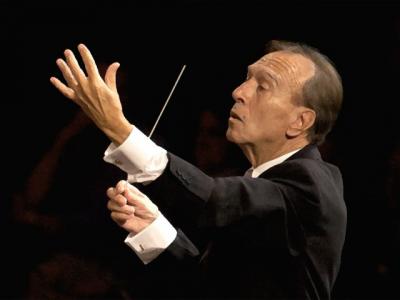Obituary: Claudio Abbado, socially committed conductor

MILAN -- For Claudio Abbado, music was necessary to improve mankind and redeem lives that otherwise would have ended badly- especially among young people. Art had a real purpose: it could save them from crime, violence, drug abuse, and war.
The famed conductor, born and raised in Milan, died at age 80 on Tuesday, after a long struggle with cancer. He disclosed his illness to the public in 2001. In his last months the Maestro was thin, his pronounced teeth the dominant feature of his face.
But his eyes were still very much alive and constantly animated by the spark of new projects. These included the foundation of new orchestras, conceived as many small pillars on which societies can rely for inspiration and encouragement.
Abbado was born in Milan in 1933, into a family of musicians. His father, Michelangelo was a violinist, his mother, Maria Carmela Savagnone, was a pianist. He decided to devote himself to music when he was seven, after attending a concert at the Teatro alla Scala. He attended the Milan Conservatory, where he graduated in piano and conducting.
He then moved to Vienna where he dedicated himself to perfecting his craft and even managed to obtain admission to the choir of the prestigious Musikverein, the Association of Friends of Music in Vienna, to see the great directing talents of that time, such as Bruno Walter and Herbert von Karajan.
In 1958 Abbado won the first prize in 1958, at the Koussevitzky competition at Tanglewood in a contest that allowed him to make his American debut with the New York Philharmonic Orchestra.
The following year he made his debut as a conductor in Italy in Trieste and made his debut at La Scala in 1965.
In 1968, the year of the student protests in Paris and elsewhere, he made his debut at London’s Covent Garden and in December the same year conducted Don Carlos by Verdi at La Scala, in a notorious opening season edition in which students threw eggs at the refined audience.
As musical director of La Scala until 1986, Abbado steered the interest of the theatre into new, innovative projects with an in-depth focus on contemporary music, featuring performances of works by Luigi Nono and Luciano Berio and the commission and representation of world premieres of contemporary living composers such as, in 1984, Samstag aus Licht by Karlheinz Stockhausen.
He helped rediscover the great classics of the past, such as Rossini’s immortal triptych, Il Barbiere di Siviglia, Cenerentola and Un’ Italiana in Algeri directed by Jean-Pierre Ponnelle, with a philological approach, the recovery of the original scores, the study the musical era. But the milestones of the extraordinary work of Abbado at La Scala also include many other performances of Alban Berg, Igor Stravinsky, Arnold Schoenberg.
Also notable were the productions under his stewardship of Bellini (Capuleti e Montecchi), Wagner (Lohengrin) and large productions of Verdi works (Un Ballo in Maschera, Simon Boccanegra) in addition to Boris Godunov directed by Lubimov.
In the 1970’s, Abbado strengthened the ties between art and social commitment, offering at La Scala concerts for students and workers at reduced prices as well as bringing classical music to factories and trying to involve suburban areas.
After La Scala, his ties with German music and Mitteleuropean culture resurfaced: Abbado was appointed music director of the Staatsoper in Vienna and in 1989 he was elected chief conductor and artistic director of the Berlin Philharmonic. It was the first non-Austro-Germanic director to be ever elected there, an appointment made even more important because he succeeded Karajan. Many triumphs followed, and his commitment in South America in collaboration with the Simon Bolivar orchestra founded by José Antonio Abreu involved the "System" to snatch off the streets thousands of marginalized young people.
Claudio Abbado always conducted with a smile on his face, a counterpoint to his focused, demanding and uncompromising demeanour during rehearsals. He was made in August a Senator for life in Italian Parliament, an appointment which he turned into yet another act of solidarity, donating his salary to students of the Music School of Fiesole.
(Massimiliano Chiavarone)
Claudio Abbado, born Milan, June 26, 1933. Married Giovanna Cavazzoni, 1956, dissolved 1968. He is survived by his former wife and their children Daniele and Alessandra, as well as by Misha, a son by his companion, Russian violinist Viktoria Mulova, and a fourth chilkd, Sebastian. Died Jan. 20, 2014


